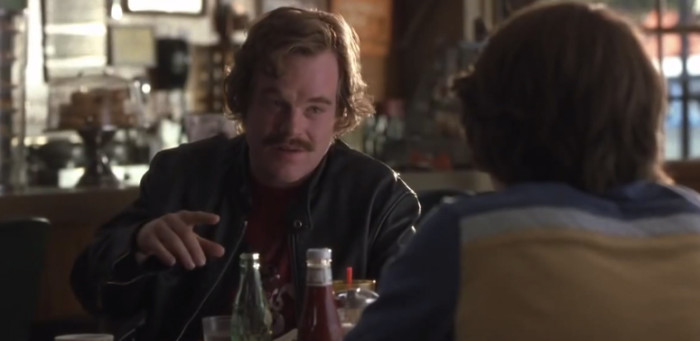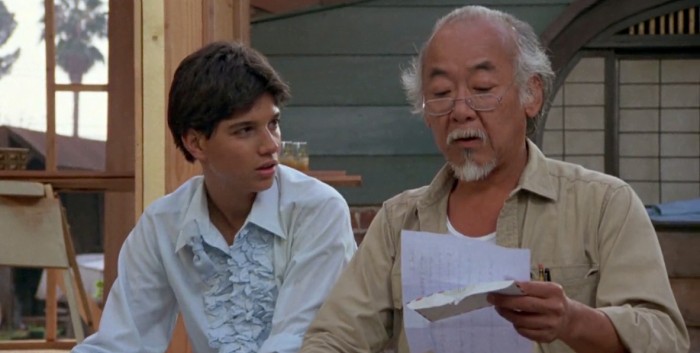/Answers: Favorite Movie Mentor
Every week in /Answers, we attempt to answer a new pop culture-related question. This week's edition asks "Who is your favorite movie mentor?" As always, we have submissions from the /Film writing crew and podcast team. This week, we are also joined by Cars 3 director Brian Fee.
If you'd like to share your pick for your favorite movie mentor, please send your thoughts to slashfilmpitches@gmail.com for a chance to be featured on the site. Find our choices below!
Brian Fee: Paul Newman in The Color of Money
What he got out of it is not what he expected. Right? There's reasonings for how he started. The transformation he went through in the process is that's what's interesting to me. When you get out of it something you didn't expect.
Peter Sciretta: Yoda in The Empire Strikes Back
I tried to resist, but yes, I'm going to go with the obvious answer for this edition of /Answers. I don't think there is a movie mentor that I have quoted more from throughout my life than Yoda from The Empire Strikes Back. "Adventure. Excitement. A Jedi craves not these things." "Judge me by my size, do you?" "Wars not make one great." And, of course, "Do. Or do not. There is no try." There are so many great things about Yoda. I love the idea that wisdom and training can come from not only the most powerful looking warriors, but also a small green old alien living in the swamp. (I must mention I was also strongly considering Mister Miyagi from The Karate Kid, which follows the same character troupe.)
As a big fan of the Muppets, I also love the masterful practical puppeteering and voice work by the legendary Frank Oz, who brought the character to life. I'm not as much of a fan of the prequel era Yoda, who is computer animated and often talks in backwards rhymes for almost no reason. I think I like the idea of Yoda as an old hermit living in the swamps of Dagobah rather than him holding council at the Jedi headquarters.
Jacob Hall: Mickey in Rocky
There is no bullshit in Burgess Meredith's Mickey, the coarse, blue collar trainer to Sylvester Stallone's amateur boxer, Rocky Balboa. He's a tough guy living in a tough city, a seasoned professional who has seen fighters come and go and can't help but be furious when he sees the "Italian Stallion" wasting his talents as a two-bit crook. Mickey is not one for big speeches or words of kindness or encouragement – he's all about hard work. He's not magical. He doesn't have the answers you want. But he will scream in your ear until you find whatever the hell you need deep within yourself to get the job done.
The later Rocky movies find Mickey hitting more familiar and traditional beats, but I'm a big fan of his depiction in the original 1976 masterpiece. Like the rest of the film, he's specific enough to feel universal, a character so lived-in and rough around the edges that you wonder if he somehow stepped right out of an old Philadelphia boxing gym and on to the screen.
Hoai-Train Bui: Ursula in Kiki’s Delivery Service
It says something about the state of movies that there are barely any female movie mentors, and says something more that you have to look across the Pacific Ocean at animated films to find one. And no, I didn't choose Ursula, the idiosyncratic painter from Kiki's Delivery Service, as my favorite movie mentor because she fit these two sets of criteria (although they helped). I chose her because she gave some sage advice to a struggling young witch who had set out to live apart from her family, that resonated with me as a 10-year-old girl and resonates with me even more now.
Ursula is a solitary painter who the naive witch Kiki runs into on one of her misadventures early on in her flying delivery service. At first terse with Kiki, Ursula slowly becomes one of her closest friends, and is there to advise her when Kiki loses her ability to fly. It's one of my favorite exchanges from the movie. Ursula recounts to Kiki the time when she, once so passionate about painting, got painter's block and wasn't able to paint anything that wasn't a poor copy of something greater.
"But then I found the answer," Ursula said. "You see, I hadn't figured out what or why I wanted to paint. I had to discover my own style. When you fly, you rely on what's inside of you, don't you?"
"Uh-huh," Kiki responded. "We fly with our spirit."
"Trusting your spirit, yeah yes! That's exactly what I'm talking about. That same spirit is what makes me paint, and makes your friend bake. But we each need to find our own inspiration, Kiki. Sometimes it's not easy."
It's a wonderfully mundane answer to an elevated, magical situation because at its heart, Kiki's Delivery Service is a simple coming-of-age story. As a young child without many worries or responsibilities, it had blown my mind when Ursula explained it, but it's advice that I still have to return to even now. When we're weighed down by anxieties or stress, we just have to find our own inspiration.
Ethan Anderton: Lester Bangs in Almost Famous
Here's a theory, for you to completely disregard: almost every single line said by Philip Seymour Hoffman as real life rock critic Lester Bangs is a piece of sage advice. Longtime readers of /Film know that almost every single person who has been on the staff has a special connection with Almost Famous. Much of that comes from the fact that we see a little of ourselves, albeit in an idealized fashion, in William Miller as he navigates the crazy world of rock journalism with the help of Lester Bangs.
If you take this quote from Lester Bangs in Almost Famous and replace all the music talk with movies, then you get an idea of what this job can be like from time to time, sans the drugs and girls:
"You cannot make friends with the rock stars. That's what's important. If you're a rock journalist – first, you will never get paid much. But you will get free records from the record company. And they'll buy you drinks, you'll meet girls, they'll try to fly you places for free, offer you drugs... I know. It sounds great. But they are not your friends. These are people who want you to write sanctimonious stories about the genius of the rock stars, and they will ruin rock and roll and strangle everything we love about it."
Lester Bangs gets plenty more screentime in the extended "Untitled" cut of Almost Famous, and he's easily one of the most insightful characters I've encountered in film. Everything he says strikes a chord with me every time I watch this film, but none feels so true to anybody and everybody as when he says, "The only true currency in this bankrupt world is what you share with someone else when you're uncool."
Jack Giroux: Dewey Finn in School of Rock
Not all mentors are wise, responsible, or have a job that pays the rent. Dewey Finn (Jack Black), like a lot of Richard Linklater's characters, knows how to have fun though, which he teaches to the kids of Horace Green Prep School. He may not teach his students math, but he does help them all grow more comfortable in their skin. That's probably not a lesson Ned Schneebly would've taught the class. Schneebly also wouldn't have asked them all to join a band for selfish reasons, which is another reason to love Dewey Finn: he is far, far away from the cinema's greatest mentor. He's more often than not more childish than his students. He's flawed and real, which is maybe what helps ground a concept that reads as a little silly on paper. This fake teacher ultimately helps his pupils through the almighty power of rock music, rarely with big, grand speeches, although he's not without a few words of wisdom. He treats the kids with respect, sees greatness in them, and usually admits when he's wrong. There's a lot to love about Dewey Finn, a mentor with charisma, passion, good taste in music, and an undying love for stage dives.
Ben Pearson: Terence Fletcher in Whiplash
J.K. Simmons' Terence Fletcher – the intense, abusive mentor in Damien Chazelle's 2014 movie Whiplash – was loosely based on Chazelle's real high school band instructor, but the brilliance of the movie, and of Simmons' Oscar-winning performance, is that you don't have to be a musician to understand the complete terror that an authority figure can have over you. Anyone who's been scared of a shout-happy sports coach or gym teacher with a penchant for losing their cool can relate to Miles Teller's drummer character, but the reason Simmons' Fletcher is so great is that he isn't just a loudmouth who gets off on having power over his students: his intensity is in pursuit of perfection.
Not everyone can handle that kind of pushback, but Fletcher knows that if he's able to find one student who goes on to become a music legend, his entire career will have been worth it. Simmons' Fletcher and Teller's Andrew Neiman have an incredibly brutal relationship throughout the movie, but it all comes to a head in Whiplash's bravura final sequence, when Fletcher realizes Neiman has what it takes to go the distance and achieve that legendary status. The hope that comes over Fletcher's face as he realizes that Neiman is living up to his full potential, and the way the two finally click as teacher and student in those breathtaking final moments of Neiman's impromptu drum solo, is masterful to behold. It's my favorite example of a mentor in a movie finally seeing his protege take flight.
Christopher Stipp: Tyler Durden in Flight Club
Sure, you could go Yoda or Mr. Miyagi, but those endless buckets of wisdom don't have quite the nihilism I need in a philosopher and pontificator of life. Enter Tyler Durden.
There's something that needs to be said about the lessons imparted by Durden throughout Fight Club and how they give context around a world that has become less about the naturalistic pursuit of securing food, water and shelter but more about the obsessions of a consumer class. Not only that, but his thoughts on the human condition in the era we're now living have profound resonance on the generation now making their way through this world. "You are not a beautiful or unique snowflake," he says, and it's a rebuke to the endless psychobabble being peddled to a culture that needs, is desperate, for individualistic validation.
I do not subscribe to all of Durden's thoughts, but this movie was a cannon blast to those of us who are sometimes feeling adrift. He's inspiring, in a way, in that these observations validate what many of us deep down know to be as true as anything can be. To wit, this is probably the most insightful observation: "Advertising has us chasing cars and clothes, working jobs we hate so we can buy shit we don't need. We're the middle children of history, man. No purpose or place. We have no Great War. No Great Depression. Our Great War's a spiritual war...our Great Depression is our lives. We've all been raised on television to believe that one day we'd all be millionaires, and movie gods, and rock stars. But we won't. And we're slowly learning that fact. And we're very, very pissed off." Yoda's grammatically loopy philosophy is great but I'll take this dose of self-actualization in the face of hard reality every single time."
What do you think of our picks? Who's is your favorite mentor from the movies? Talk about it in the comments below or email your personal answer (a paragraph or more) to slashfilmpitches@gmail.com with the subject title "Favorite Movie Mentor." Our favorite responses will be featured on the site in a future post!



